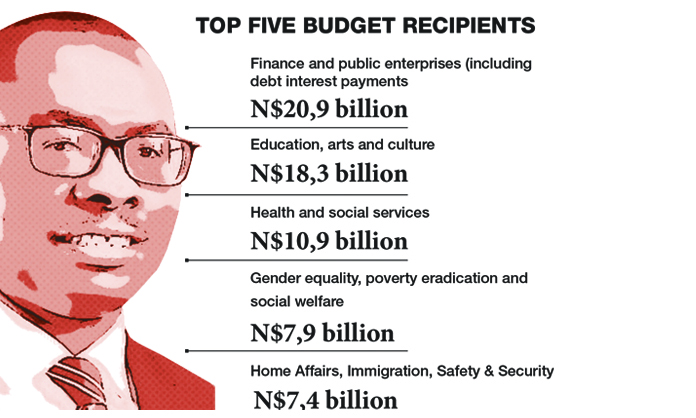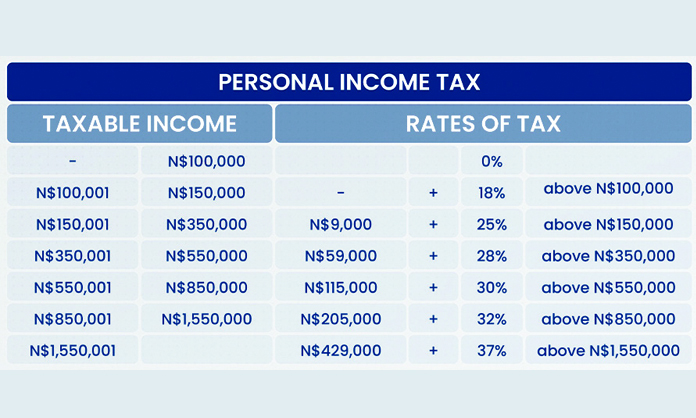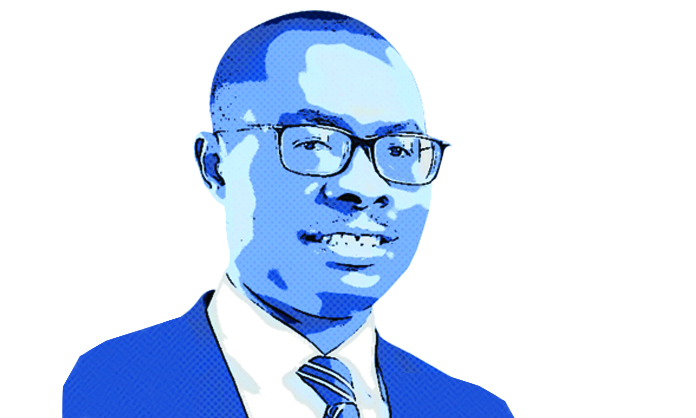… opposition catches feelings, accuse minister of trying to attract votes for Swapo
Minister of finance and public enterprises Iipumbu Shiimi has been accused of tabling an “election-centred budget” yesterday, which attempts to sway, among others, pensioners, students and low-income earners to Swapo in the upcoming presidential and National Assembly elections.
The massive N$100-billion budget is the largest in the history of Namibia’s democracy and comes during an election year in which both voter apathy and the current economic challenges were expected to impact Swapo’s votes.
Shiimi told the parliament yesterday that the expenditure plan is pro-poor and meant to stimulate development and boost infrastructure development in the country.
Speaking to Desert Radio yesterday, former deputy executive director of finance, chartered accountant and independent presidential candidate Ally Angula predicted that Shiimi would deliver a budget anchored in pleasing pensioners with increased grants, students with better grants, as well as lower middle-income earners with a tax threshold adjustment as Swapo looks to cement votes ahead of the watershed presidential and National Assembly elections in November.

Swapo suffered a huge blow during the last election with its then presidential candidate, the late Hage Geingob’s votes dropping from 87% in 2014 to 56,3% in 2019. The party also lost its two-thirds majority.
Yesterday’s budget was themed ‘Continuing the Legacy of His Excellency, President Hage G Geingob, by Caring for the Namibian Child’.
Swapo will field a woman candidate, most likely vice president Netumbo Nandi-Ndaitwah, for this year’s elections, who will go into a bruising encounter with Independent Patriots for Change (IPC) leader Panduleni Itula, Landless People’s Movement (LPM) leader Bernadus Swartbooi, Popular Democratic Movement (PDM) leader McHenry Venaani, and independent candidate Angula, among others.
“You would expect the minister of finance to announce a budget that will increase pensions to benefit the elderly, who are part of the faithful voters.
“Young people do not normally vote, but we are making sure we educate them on the importance of voting and also understand that the budget is part of their money they pay through taxes – not a favour,” Angula said.
The same sentiments were echoed by Basic Income Grant (BIG) proponent and social justice activist Rinaani Musutua.
She said she would have liked Shiimi to allocate money towards improving social safety nets.
“The government will complain about anything that would improve the lives of Namibians, but they are putting money into constructing large buildings that benefit foreign companies.

“If you go to Katutura you would be forced to believe there is no independence in that part of town, because it simply looks different from the other side of town,” she said.
Epafras Mukwiilongo, the president of Namibian Economic Freedom Fighters (NEFF), says while the budget is focused on the needs of the people, it may be an election ploy from the Swapo government.
“One must remember, 2024 is an election year, and these guys can be very smart. Where they have allocated money, they know exactly what they are doing,” he said yesterday.
Mukwiilongo asked whether the budget allocation was done in the best interests of the general public or Swapo.
“These people want to put money into projects they know they can mobilise to campaign for Swapo,” he said.
Political analyst Rui Tyitende yesterday said Shiimi’s budget is indeed tailored to attract lower-income earners, based on the increased tax threshold from N$50 000 to N$100 000.
“The people who fall in this category are mostly security guards, cleaners, retail workers, and other low-income individuals. More importantly, they are the ones who have the propensity to vote, compared to their ‘middle-class’ peers,” he said.
Tyitende said if the government had its way with the fiscus, it would have splurged significantly to the benefit of everyone.
“But we are broke and they know that,” Tyitende said.
He said the budget does not address deteriorating socio-economic conditions in the country.
“With the current budget, the Swapo-led government will have difficulty justifying why it must return to office,” Tyitende said.
He said profound economic grievances remain and will continue to haunt the 1,6 million people drowning in poverty.
“To cut costs, they should have trimmed the salaries, benefits and other non-essential costs of political office-bearers and divert them to the social sector, so as to at least partially realise the aspirations of president Geingob,” Tyitende said.
SOCIAL SAFETY NETS
Shiimi’s budget included some additional money for the over 600 000 people on social grants.
The budget saw old-age pensions and disability grants increased by N$200, bringing them to N$1 600 from the current N$1 400.
This increase would cost the government N$4 billion for old-age pensions and N$1,6 billion for disability grants.
“Investments in the social sectors will absorb 50,7% of the budget, equivalent to N$44,3 billion during the 2024/25 financial year,” Shiimi said.
TAX REPRIEVE
Shiimi also provided a tax reprieve to low-income earners by revising the tax threshold from N$50 000 to N$100 000.
“This will result in an injection of N$646,0 million directly into the pockets of taxpayers,” he said.
Additionally, provision has been made in the two remaining financial years of the medium-term expenditure framework for adjusting all tax brackets for inflation.
“In this regard, a total of N$712,9 million per annum in direct relief to taxpayers has been provided for,” Shiimi said.
PwC senior country partner Chantel Husselmann yesterday told Desert Radio that the tax reprieve would see Namibia’s consumer purchasing power strengthened.
“Firstly, for our employed Namibians this would imply that fewer would have to be registered for personal income tax when the threshold has been increased to N$100 000.
“The rest of the employees who are registered for income tax would then have more disposable income at hand, because individuals are being taxed at a sliding scale. So that would effectively mean that per tax bracket available, less tax would have to be paid.
“This increased spending power may result in increased consumption of goods and services locally, which is a positive for the economy.
“This will not be a new announcement as it has already been announced at the 2023/24 budget speech last year this time,” she said.
YOUTH
The budget allocated to the Ministry of Sport, Youth and National Service has increased by 45,3% to N$679,4 million in the 2024/25 financial year and a total of N$2,2 billion over the medium-term expenditure framework period.
“Allocations have been made to various youth programmes to support skills development and capacity building,” Shiimi said yesterday.
He said N$124 million has been provided in the development budget for, among others, upgrading Independence Stadium, as well as various sport facilities and multipurpose youth centres across the country.
The Namibia Student Financial Assistance Fund (NSFAF) received an additional N$200 million, bringing the total allocation to N$2,3 billion from N$2,05 billion last year.
According to Shiimi, this budget will accelerate investment in productive public infrastructure through an increase in the development budget to expand social infrastructure.
Economist Omu Kakujaha-Matundu yesterday said Shiimi used a slightly higher revenue estimate of about N$90,4 billion to increase the budget to N$100 billion.
“In that sense, increasing spending without substantially increasing the deficit,” he said.
He said the increase in the old-age pension by N$200 is a welcome gesture, adding it would in a small way provide a much-needed social safety net.
Further, the raising of the threshold will leave consumers with extra dollars in their pockets.
However, part of this would go back to the fiscus through value-added tax.
Stay informed with The Namibian – your source for credible journalism. Get in-depth reporting and opinions for
only N$85 a month. Invest in journalism, invest in democracy –
Subscribe Now!






